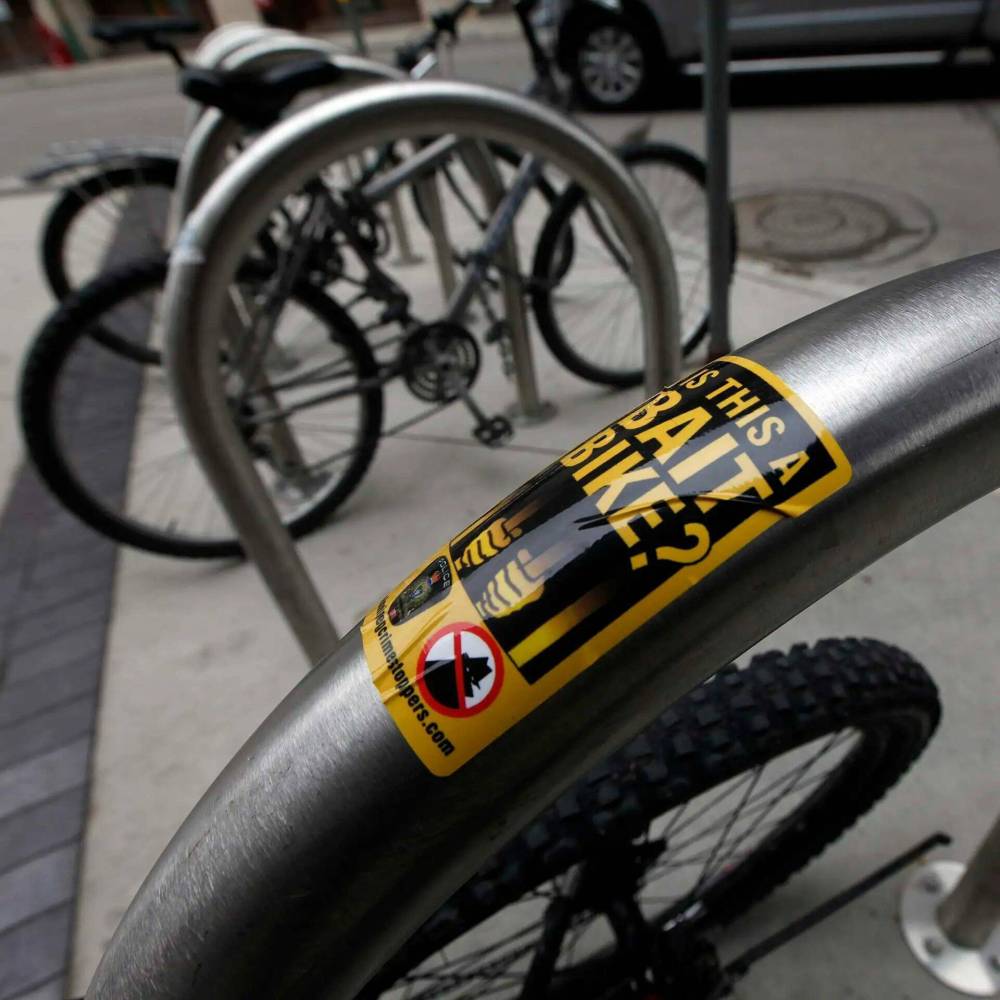Safe communities and the rule of law
Advertisement
Is it ever the case that simple crime prevention tactics can overstep the boundaries of what should be considered acceptable?
Are they justified if they’re successful, even if they push the boundaries of the rule of law?
These are fair questions to ask in any country that abides by the principle. People obviously have the right to feel safe in their communities, and to have their property protected from theft. But citizens should also have the right to protections against unchecked power.

File photo
Bait Bike stickers were displayed on bicycle racks at the Millennium Library in 2018.
Some actions are uncontroversial. People who regularly take the bus have probably noticed the increase in community safety officers patrolling specific routes to “remind” passengers that transit is a paid service. Those who try to board without paying are refused a ride.
This crackdown according to Mayor Scott Gillingham, a dual effort to ensure Transit is generating appropriate revenue, and to reduce incidents that threaten the safety of both riders, and operators.
To prevent the sale of regulated products to minors, the Province of Manitoba deployed a team of “undercover” teenagers in 2023 to try and buy lottery tickets from licensed retailers. Called the “minors as agents program,” it has been so successful it was recently expanded to include licensed cannabis and alcohol retailers.
Fines for selling to under-agers can be steep – $2,500 for cannabis, $5,000 (plus court fees) for liquor, and between $100,000 and $500,000 for lottery tickets – but no fines were given to sellers who didn’t ask for identification. To date, no repeat offenders have been detected.
To curb bike theft – an issue which Coun. Markus Chambers, then-chair of the Winnipeg Police Board, described this past summer as a problem of “epidemic proportions” – the city has revisited a similar, but arguably more problematic strategy.
Called the “bait bike program” when originally implemented around eight years ago, it is essentially a trap intended to catch bike thieves in the act by leaving bicycles in high-risk public areas, then waiting for them to get stolen. Unlike “minors as agents,” there are real legal consequences for thieves who are caught.
But the question them becomes – should this be considered entrapment?
In legal terms, entrapment is the action of tricking someone into committing a crime. In Canada, there are two types – opportunity-based, and inducement-based.
The first describes a situation in which a person has been “offered” an opportunity to commit a crime. The second is when some form of pressure has been exerted on top of that, and is grounds for a case to be dismissed due to abuse of process.
“Bait bike” easily clears the second parameter. But bike theft is as much a problem today as it was nearly a decade ago. Legality aside, there is an argument to be made, however thin, that the bait bike program could be predatory.
Catching individual thieves is part of law enforcement. But a program that doesn’t prevent a real crime from being committed, and which doesn’t target whoever ultimately benefits from the proceeds of that crime, is missing the target.

Andrew Braga
South Osborne community correspondent
Andrew Braga is a community correspondent for South Osborne.
Our newsroom depends on a growing audience of readers to power our journalism. If you are not a paid reader, please consider becoming a subscriber.
Our newsroom depends on its audience of readers to power our journalism. Thank you for your support.




